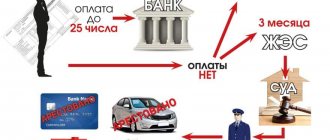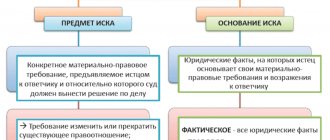Home / Housing disputes / Eviction of a registered person from a municipal (non-privatized) apartment
Needy categories of people have the right to receive municipal housing. After moving in, residents become tenants of a non-privatized apartment. The parties enter into a social rental agreement, under the terms of which the municipality provides residential premises to the tenant and his relatives.
Residents' responsibilities:
- pay for housing and communal services;
- pay a fee for the use of housing;
- use the apartment only for its intended purpose;
- follow the rules of living in the house;
- renew the social tenancy agreement;
- notify the owner of life changes.
It would seem nothing complicated? But it happens that residents violate the rules of living in a municipal apartment. And systematically. If the acceptable line is crossed, the owner has the right to evict the negligent tenant and members of his family.
The main differences may be related to the nature of the eviction: the consent of the tenant or a forced order, the eviction of a registered and unregistered person. There are many nuances, so we will try to sort them out from the legal perspective.
Read our other materials: “How to evict a roommate from your apartment?” or “How to evict the owner from an apartment?”
Status of a non-privatized apartment
Non-privatized housing is a room in a communal apartment or a full-fledged apartment or house in the private sector, which has not been transferred to the private ownership of a citizen.
Regardless of the reason for receiving the premises: due to the social status of the person (disabled person, large family, etc.) or from the enterprise or organization in which he worked for many years, the rights and responsibilities are the same. However, the question regularly arises: “Can they be evicted from a non-privatized apartment?”
Kinds
The right to housing and its inviolability is one of the basic constitutional guarantees of every citizen. Therefore, issues related to eviction are under special legal protection.
This procedure can occur in two forms:
- voluntarily - in this case, the landlord and the tenant agree on eviction, and the latter himself agrees to vacate the premises;
- forcibly - occurs without the desire of the tenant and only in court, if there are grounds for this and significant evidence.
It is also possible to distinguish types of eviction depending on who initiates this procedure : representatives of the state or municipal housing stock to which this apartment belongs or other residents (for example, neighbors or family members of the tenant).
Depending on the available grounds and in accordance with Art. 84 of the Housing Code of the Russian Federation, eviction can be divided into the following types :
- with the provision of other housing;
- without providing other housing.
The first type most often includes situations where citizens are evicted from a dilapidated or demolished house.
also be provided with other social housing in cases where the reason is prolonged non-payment of utility bills.
If a tenant violates the rules of living in the house and the interests of neighbors, then he will be evicted without providing him with other housing. Read about evicting noisy neighbors in this article.
Consultation with lawyer Oleg Sukhov. Topic of video consultation: Eviction from a municipal apartment
Social hiring
Living in non-privatized housing does not happen by itself, but is documented.
The check-in procedure is standard:
- the authorized body adopts an order on the provision of housing;
- a warrant is issued that is valid for a limited time;
- a social tenancy agreement is concluded, usually for an indefinite period.
If housing was obtained before the current legislation came into force, then the relationship is viewed through the prism of concluding a social tenancy agreement. For example, housing was provided during the Soviet period, but when considering the dispute, the provisions on social rent are taken into account.
Legislative regulation
What documents answer the question of whether they can evict from a non-privatized apartment?
- LCD - Housing Code.
- Civil Code of the Russian Federation - Civil Code.
- Regional laws and regulations.
- Federal Government Regulations.
The housing complex contains basic rules: the grounds for obtaining housing, the rights and obligations of residents, the procedure for concluding a social tenancy agreement and its termination.
The norms of the Civil Code are of a subsidiary nature, i.e. they complement the norms of the Housing Code if a gap in regulation arises.
From the by-laws, you can indicate a standard social tenancy agreement.
Regional authorities adopt regulations on the conclusion of social tenancy agreements. They contain both a sample contract and a list of documents and describe the procedure for the authorities and the applicant. If the apartment is not privatized, can they be evicted from it? The law provides an answer based on specific circumstances. In one case they really can, in another - not.
Grounds for eviction
Receiving housing for use from the state or municipality is determined by the status of the person. In some conditions, the reason for which it was provided disappears, and the tenant is evicted. In others, circumstances have not changed, then eviction is impossible.
What circumstances cause eviction?
- the grounds for moving in are temporary;
- the tenant systematically violates the rights of other tenants;
- a person damages the apartment in which he lives;
- debts for utilities have accumulated;
- recognition of the house as unsafe;
- the tenant has actually moved to another residence for an extended period of time.
The list presented is not complete; each item has many options.
Eviction from a non-privatized apartment is permitted if there are circumstances specified by law.
Further location of the citizen
The further location of a person who is forced to leave their home depends on the specific situation, the reasons for the complaint and the court decision. If the reason was non-payment of funds for the use of the premises and utilities, then the municipality is obliged to provide him with another place of residence in accordance with Art. 90 LCD.
When the cause is damage to a residential property and/or its destruction, violation of fire safety standards and other similar situations, the court gives the person the opportunity to correct the consequences of his actions and prevent a recurrence of the situation.
A certain period of time is given for this. And only if during this time the problem has not been eliminated, he is evicted - in this case, without the provision of other housing. The same applies to violations of sanitary standards - here they may be given a period to correct the situation.
In other cases, the municipality is not obliged to provide a person with living quarters. Therefore, if a citizen behaves inappropriately towards neighbors and cohabitants or uses the property for other purposes, he is simply evicted, having previously allocated a period to find a new apartment.
What rights and responsibilities does the tenant have?
Do those living in a non-privatized apartment have much less rights than if they were the owners? The tenant has, according to the law, the following list of rights:
- move in your family members;
- rent out part of the housing to another person or persons for a temporary or unlimited period;
- replacing or exchanging residential premises for another, more suitable one;
- demand the provision of utility services and participation in major repairs.
Existing rights are closely related to responsibilities. The law obliges the tenant:
- use housing only for living (for example, organizing industrial production is prohibited);
- ensure the safety of the premises (carry out routine repairs, monitor communications so that, for example, there is no flooding of neighboring apartments);
- pay utility bills in full and on time;
- inform the authority that granted the right to premises about changes in circumstances affecting the prospects for further residence; for example, that the financial situation has changed, and the owner of the premises is no longer low-income.
Agreements signed with residents have more specific provisions, but we must remember that they are not exhaustive and the current legislation is also added here.
What to do to avoid being left homeless?
If you don't want to become homeless, you need to follow some simple rules:
- Follow the law: pay your rent on time, don’t be rowdy, don’t destroy your home.
- Remember that eviction can only be done through the courts. If you don’t agree with the district administration, under no circumstances move to another apartment. It is almost impossible to “beat” voluntary resettlement.
- The law requires that the owner of the apartment first make a claim and give time to correct it. If this procedure is not followed, the court will not satisfy the claim.
- And most importantly, seek advice from a lawyer working in your city. Relations related to housing are regulated not only by federal, but also by local legislation, and there may well be nuances that will work only in your case.
Who decides the issue of eviction?
Can they be evicted from a non-privatized apartment only by decision of the administration or the organization that provided the housing? No, the Constitution limits the list of persons who have the right to evict a citizen. Now only the court has this right. Interested parties have the right only to file a claim for eviction.
A judicial act that has entered into legal force is executed by bailiffs. The police are supporting them. This means that the police or other official do not have the right to evict someone without a court decision, and one that already has legal force. It doesn't matter what caused it to be adopted. Even if we are talking about reporting information that actually did not take place, which became known after the move-in.
Can I be evicted for debt?
In order to be able to evict tenants for non-payment of utilities, it is necessary to perform certain actions that are regulated by the Housing Code of the Russian Federation. As a rule, the eviction of tenants does not occur on a voluntary basis, since rarely does anyone want to vacate the apartment themselves. Therefore, such tenants are mainly evicted by decision of the judicial authorities. Debts can cause eviction for non-payment of utilities and mortgage debts. Debts on utility bills must arise six months before the tenant goes to court. In addition, the amount of debt must be above 50 thousand rubles.
The eviction process is regulated by the Housing Code of the Russian Federation (90 Housing Code of the Russian Federation). After a court decision is received, the apartment will be sold at auction. Part of the proceeds from the sale will be used to pay off utility debt or mortgage. Such cases are common today, and if obligations are not met, the credit institution also insists on eviction.
Features of participation in the case
The facts confirming the termination of the right of residence are proven by the plaintiff. Only the administration, or government authority, or organization that provided housing can act in this capacity. The management company with which the contract for maintenance of the house is concluded does not have such a right. Residents whose rights are violated also have the right to file a claim.
What rights do tenants living in a non-privatized apartment have when one of them is evicted? They preserve them in full. For example, a family lives in an apartment, and they want to evict one of its members in court. The court is obliged to ensure their participation in the case as third parties, because the proceedings affect their rights and interests.
Procedure for drawing up a statement of claim
The basic requirements for drawing up a statement of claim are as follows: it must be in writing and also contain the necessary details. It is also important to indicate the circumstances that contribute to the tenant being evicted.
Before filing a claim, you must pay the state fee, and a receipt confirming payment is attached to the claim. In addition, documents confirming the grounds for eviction of the tenant are also attached to the claim. The list of documents attached to the statement of claim will be as follows:
- Registration certificate for the apartment;
- Receipt confirming payment of the state duty;
- An extract containing information that the tenant has an overdue debt;
- Social rent agreement;
- Documents that can confirm that the tenant committed violations while living in the apartment.
Features of proof
If the apartment is not privatized, can they evict? Yes, but the claim must be substantiated. Often, as a result of legal proceedings, it turns out that there is a debt for services, but it is not large enough and the reason for the accumulated debts is due to difficult life circumstances.
If we are talking about the destruction of a residential premises, its damage, materials from the housing inspection are provided. Her responsibilities include identifying violations of housing laws. A protocol is drawn up in accordance with the norms of the Code of Administrative Offenses, then a decision is made to prosecute.
Having two or more such decisions, the apartment owner will have the right to go to court.
Some residents constantly make noise, make trouble, and disturb the peace. In this case, the police take action. A protocol is drawn up, then a decision is made. As a rule, the court already makes a decision on police reports. In particular, the grounds for eviction are facts of violence.
It is important to comply with the procedure for bringing to administrative responsibility, the actions of the authorities according to their competence, otherwise a well-founded claim will be rejected.
Causes
The reasons for depriving a person of the right to live in a municipal apartment are regulated by the same articles 90 and 91 of the Housing Code.
To file a lawsuit to evict a tenant, you need any of the following grounds:
- Failure to pay rent unless there is a good reason for this, and this continues for at least six months.
- Deprivation of parental rights when the court has ruled that it is impossible for the mother/father to continue living with the child.
- Systematic consumption of alcohol with bouts of violent behavior, antisocial lifestyle in general.
- Violation of the rights of neighbors, including those in the apartment, and their interests provided for by law.
- Use of the premises for purposes other than its intended purpose.
- Violation of sanitary standards.
- Destruction of a residential property (apartment) or contributing to the destruction, regardless of whether this was done on purpose or by accident.
REFERENCE. If parental rights have been deprived, the deadlines for vacating the apartment must be specified earlier. If this requirement is not met, you can immediately call the bailiffs after the set time has expired.










